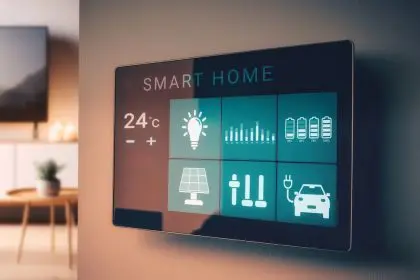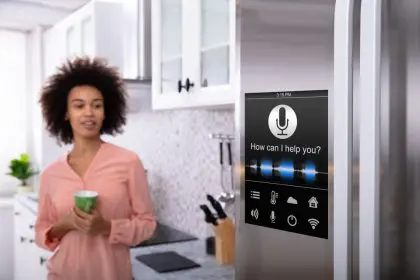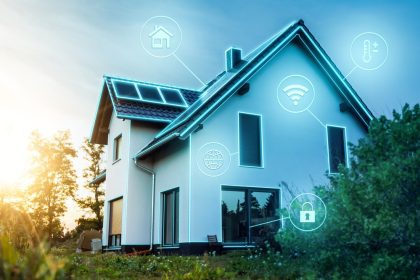The challenge of maintaining a warm home without breaking the bank has found new solutions in smart technology. Recent advances in heating systems and home automation have created opportunities for homeowners to significantly reduce their energy costs while improving comfort levels throughout their living spaces.
These innovations arrive at a crucial time, as energy costs continue to rise and homeowners seek more efficient ways to manage their utilities. From artificial intelligence-powered thermostats to sophisticated zoning systems, technology offers practical solutions for cost-conscious homeowners.
Smart thermostats lead the way
The evolution of temperature control has made traditional manual thermostats increasingly obsolete. Today’s smart thermostats leverage artificial intelligence and machine learning to optimize heating schedules and reduce energy waste. These sophisticated devices learn household routines, automatically adjusting temperatures based on occupancy patterns and daily schedules.
Most smart thermostats now include geofencing capabilities that detect when residents leave or return home, eliminating the waste of heating an empty house. Remote control through smartphone applications allows homeowners to adjust settings from anywhere, particularly valuable for households with varying schedules or frequent travelers. Integration with home automation systems enables voice commands and automated routines, while real-time monitoring helps users understand and optimize their energy consumption.
High-efficiency heating systems
Modern heating technology has revolutionized the way homes convert energy into warmth. Heat pumps represent one of the most significant advances, offering exceptional efficiency by extracting warmth from outside air, even in cold conditions. These systems operate at higher efficiency levels than traditional furnaces while providing both heating and cooling capabilities, making them an increasingly popular choice for home climate control.
Condensing boilers offer another leap forward in heating technology. These systems maximize efficiency by capturing and reusing heat that would otherwise escape through exhaust, resulting in significantly reduced fuel consumption. The precise temperature control mechanisms in modern boilers ensure optimal performance while minimizing operating costs, often paying for themselves through reduced energy bills, particularly in regions with severe winters or high utility costs.
Strategic zoning solutions
Zone-based heating represents a significant advance in temperature management, allowing homeowners to heat spaces selectively rather than warming entire houses unnecessarily. Smart zoning systems use motorized dampers in existing ductwork to direct heated air precisely where needed, while sophisticated controls adjust temperatures based on room occupancy and user preferences.
Ductless mini-split systems offer another approach to zoned heating, providing individual room control without requiring extensive ductwork modification. These systems combine high efficiency with quiet operation and minimal maintenance requirements, making them ideal for home additions or spaces that are used intermittently.
Intelligent radiator control
For homes with traditional radiator systems, smart valve technology offers a path to improved efficiency without requiring complete system replacement. These innovative devices allow individual control of each radiator through mobile applications, enabling room-specific temperature management and scheduled heating periods.
Modern smart radiator valves incorporate motion detection and weather forecasting to optimize temperature settings automatically. The system learns usage patterns over time, adjusting heat output to match household routines while maintaining comfort and minimizing energy waste. This technology transforms existing radiator systems into sophisticated networks that offer many benefits of modern heating systems at a fraction of the cost.
Advanced insulation technology
Even the most efficient heating system cannot overcome poor insulation, making modern sensor technology crucial for identifying and addressing heat loss. Smart sensors monitor for drafts and thermal leaks, while integrated systems can automatically adjust heating patterns to compensate for detected inefficiencies.
Advanced window and door monitoring systems work in concert with heating controls to prevent energy waste. When sensors detect an open window or door, the system can automatically adjust heating output to prevent unnecessary energy consumption. Some systems incorporate motorized blinds and smart window coverings that respond to temperature changes, providing an additional layer of insulation when needed.
Implementation strategies
Homeowners can approach these technological upgrades strategically by starting with a comprehensive energy audit to identify priority areas for improvement. Beginning with a smart thermostat provides immediate benefits while laying the groundwork for future upgrades. As budget allows, additional improvements can be phased in, with each upgrade building upon previous investments to create an increasingly efficient heating system.
Regular maintenance ensures optimal performance of these technologies, while monitoring energy consumption helps validate the effectiveness of each improvement. Many utility companies offer incentives or financing options for energy-efficient upgrades, making these investments more accessible to homeowners.
Looking ahead
The future of home heating technology continues to evolve, with innovations in artificial intelligence and energy storage promising even greater efficiency improvements. Integration with smart grids and renewable energy systems will provide additional opportunities for cost savings, while enhanced automation capabilities will further simplify home climate management.
As energy costs continue to rise, investing in efficient heating technology becomes increasingly important for homeowners. These systems not only reduce monthly expenses but also contribute to environmental sustainability and improved home comfort. The combination of smart controls, efficient heating systems, and advanced insulation technology creates opportunities for significant savings while preparing homes for future technological advances.
This story was created using AI technology.















